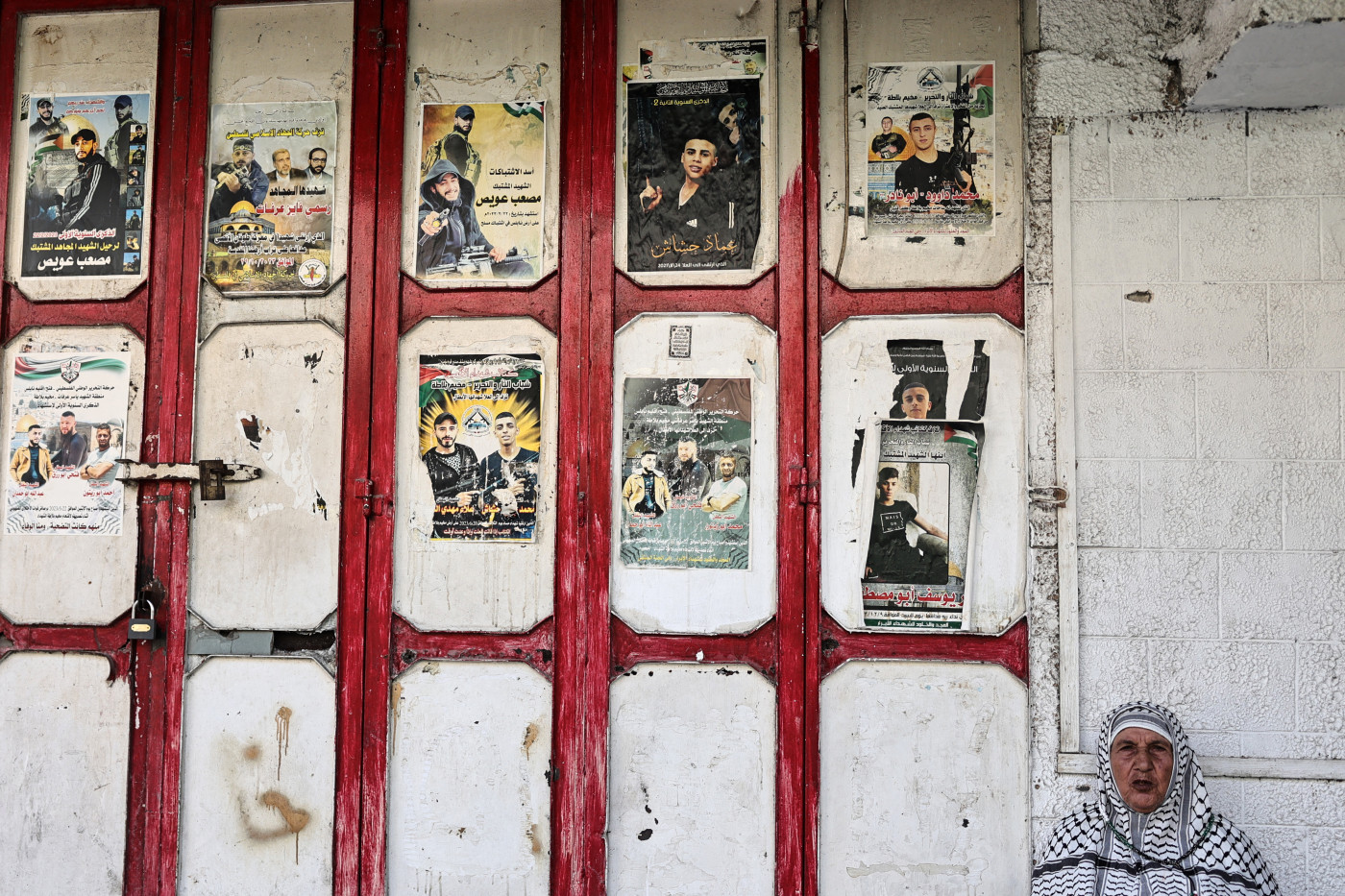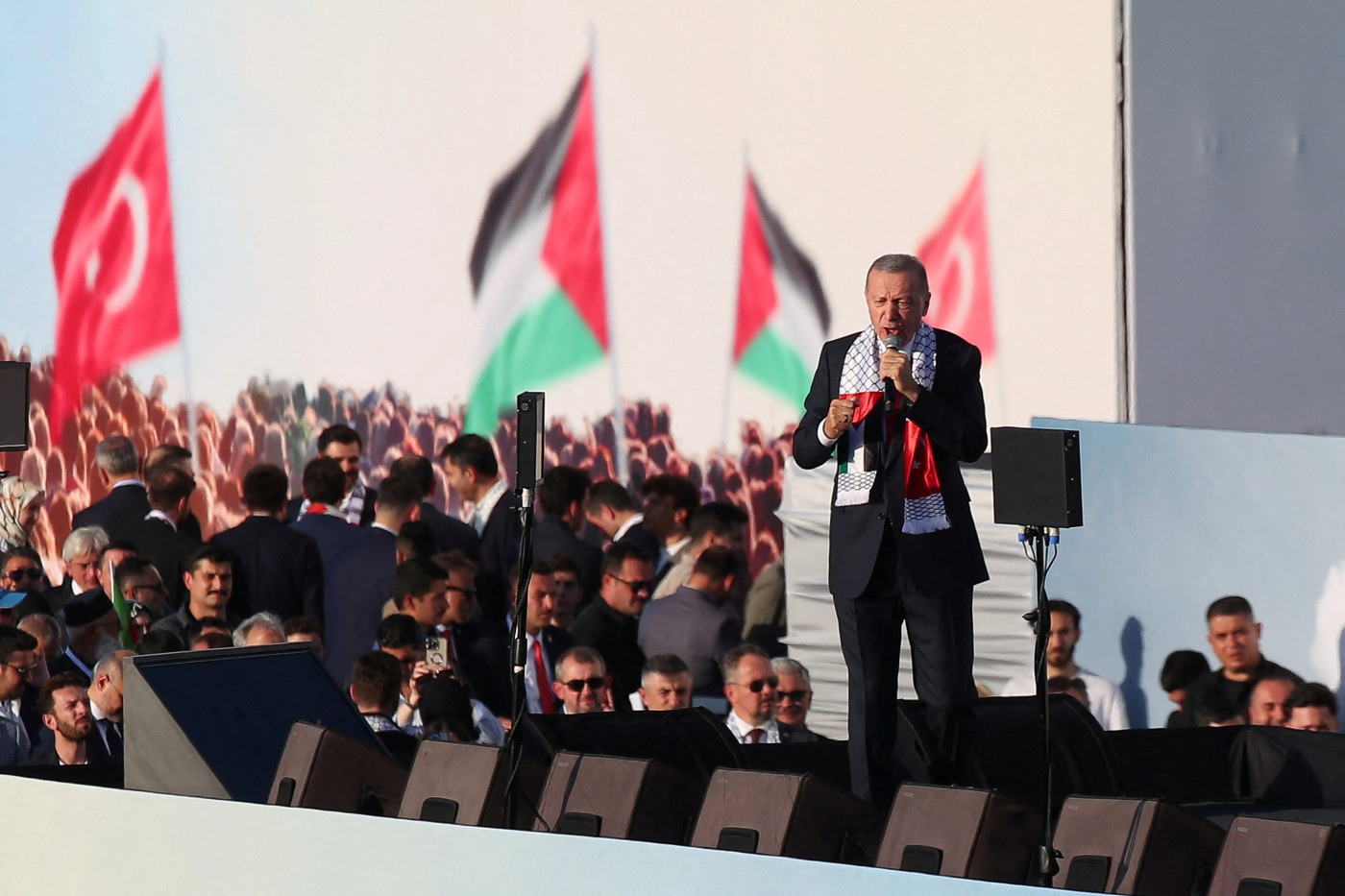Iran Ally Syria Issues Warning to Israel Over Looming 'Escalation'
Syrian officials have shared with Newsweek a new warning to Israel amid flaring regional tensions set off in part due to a deadly strike on occupied territory claimed by both nations.
The attack, which killed a dozen children and teenagers, occurred late last month in the majority-Arab Druze town of Majdal Shams in the share of the Golan Heights that has been under Israeli control since 1967 but remains internationally recognized as part of Syria. Israel blamed the strike on the Lebanese Hezbollah movement and responded last week with the killing of the group's top military official, Fouad Shukr, reportedly alongside two children, in southern Beirut.
Hezbollah has denied responsibility for the attack in Majdal Shams and vowed retaliation for Shukr's killing, which took place amid worsening clashes across the Israel-Lebanon border and war raging between Israel and the Palestinian Hamas movement in the Gaza Strip.
In a statement shared with Newsweek, the Syrian Mission to the United Nations said the country "categorically rejects the Israeli allegations regarding the Majdal Shams incident" and defended the position of Hezbollah, a fellow member of the Iran-aligned Axis of Resistance that has backed Hamas in the 10-month war in Gaza.
"The Syrian Arab Republic condemns the heinous crime that took place in the Syrian town of Majdal Shams, which led to the martyrdom of twelve Syrian children and the injury of others," the Syrian Mission said, "and affirms the responsibility of the Israeli occupation for that sinful attack which the Israeli occupation authorities used to falsely accuse other parties and to find pretexts to continue their attacks on countries of the region."
With threats of vengeance now also looming from Iran over the unclaimed killing of Hamas Political Bureau chief Ismail Haniyeh in Tehran less than a day after Shukr's death, the Syrian Mission warned that "the Israeli occupation authorities solely bear full responsibility for any escalation in the region and its consequences."
Israel and Syria remain in a technical state of war since 1948, when the latter joined a coalition of Arab nations that launched an attack on the newly declared majority-Jewish state established on territory also claimed by Palestinians. Syria again went to war alongside Arab allies against Israel in 1967, during which Israel seized further Arab territory, including much of the Golan Heights, as well as formerly Jordanian-held East Jerusalem and the previously Egypt-controlled Gaza Strip and Sinai Peninsula.
Israel withdrew from the Sinai Peninsula in 1982, following a peace treaty with Egypt, and pulled out of Gaza decades later in 2005. But Israel annexed East Jerusalem in 1980 and followed suit in the Golan Heights a year later in moves not recognized under international law.
Israel's top ally, the United States, long withheld formal recognition of the annexations until the administration of President Donald Trump, who moved the U.S. Embassy in Israel to Jerusalem in 2017 and recognized the Israel-controlled stretch of the Golan Heights as Israeli territory in 2019. His successor, President Joe Biden, has maintained the policy shifts.
Still, both territories remain sources of regional contention, and the Syrian Mission hit out at Washington as well in the statement shared with Newsweek, asserting that "the occupied Syrian Arab Golan was, is, and will remain Syrian territory, which is confirmed by all relevant United Nations resolutions, most notably Resolution 497 of 1981," which denies recognition of Israel's sovereignty over the disputed region.
"Syria stresses that the people of the Golan are Syrian Arab citizens who were, are, and will remain an integral part of the Syrian people," the Syrian Mission added, "and they remain devoted to their belonging to their homeland Syria and their national identity, and they reject the Israeli occupation and look forward to ending it and putting an end to its criminal practices against them."
The Golan Heights today is home to around 40,000 people, split roughly in half between Druze Arab residents and Jewish Israeli settlers. Most of the Druze Arab population has declined Israeli offers for citizenship, and none of the victims of the attack in Majdal Shams were Israeli nationals, according to local authorities.
Israel has nonetheless assumed responsibility for security over the Golan Heights and its residents.
"We give strength to the Druze community, our brave, full partner, with the rest of the citizens of Israel, in the war for our home, our collective home," Israel Defense Forces Chief of the General Staff Lieutenant General Herzi Halevi said during his visit to Majdal Shams in wake of the attack.
"We strongly support the residents of Majdal Shams," he added, "and we embrace the bereaved families and wish all the injured a speedy and full recovery."
White House National Security Council Communications Adviser John Kirby also condemned what he called a "horrific attack" in Majdal Shams and joined Israeli officials in blaming the attack on Hezbollah. Asked if the Biden administration still considered the Golan Heights as part of Israel, he replied, "Yes."
In the statement shared with Newsweek, the Syrian Mission also hit out the U.S. its policy, reiterating the country's "rejection and condemnation of the U.S. statements justifying the Israeli occupation of the Syrian Golan under the pretext of its importance to Israel's security."
The Syrian Mission appealed on the Biden administration to "respect international law and the principles of the UN Charter and abandon its wrongful policies, bias and unlimited support for Israel that encourages the occupation authorities to continue committing genocide, war crimes and crimes against humanity against the Palestinian people and repeatedly attack countries of the region."
Washington severed relations with Damascus in 2011 at the onset of Syria's civil war as rebel groups, some backed by the U.S., fought to topple Syrian President Bashar al-Assad, who received support from Hezbollah and Iran. As the Islamic State militant group (ISIS) began to take large parts of Syria, the U.S. shifted its support to the Kurdish-led Syrian Democratic Forces in 2015 to fight the jihadis, while Russia intervened directly on behalf of Assad.
The Syrian government and its allies retook the southern frontier across from the Israel-occupied Golan Heights from insurgents in 2018. The Syrian side has since been manned by Russian military police and various Iran-aligned militias that have set up strategic outposts.
Israel, meanwhile, has regularly conducted airstrikes against suspected militia positions and sites allegedly linked to Iran across Syria. One such strike in April led to the deaths of senior Iranian military officials at an Iranian consular building in Damascus, to which the Islamic Republic responded with its first-ever direct missile and drone strike against Israel.
Today, Iran is again weighing retaliation against Israel over the killing of Haniyeh, though the officials have yet to broadcast the timing or scope of the anticipated operation.
As the seventh day passed since the Hamas chief's death, speculation has mounted as to whether a last-minute deal, particularly a breakthrough on long-deadlocked Gaza ceasefire talks, may allay Iran's vows for revenge. Responding to Newsweek's question during a White House press briefing Wednesday, Kirby said the U.S. was "involved in some pretty intense diplomacy here across the region" in order to prevent an escalation.
But the Iranian Mission to the United Nations asserted in a statement shared with Newsweek later that same day that Tehran was looking to both push for an end to the war in Gaza and answer for Haniyeh's killing.
"We have pursued two priorities simultaneously," the Iranian Mission said, "first, establishing a durable ceasefire in Gaza and the withdrawal of the occupiers from this territory; second, punishing the aggressor for the assassination of Martyr Haniyeh, preventing the recurrence of the Israeli regime's terrorist aggressions, and making the Zionists regret embarking on such a trajectory."
Disclaimer: The copyright of this article belongs to the original author. Reposting this article is solely for the purpose of information dissemination and does not constitute any investment advice. If there is any infringement, please contact us immediately. We will make corrections or deletions as necessary. Thank you.

